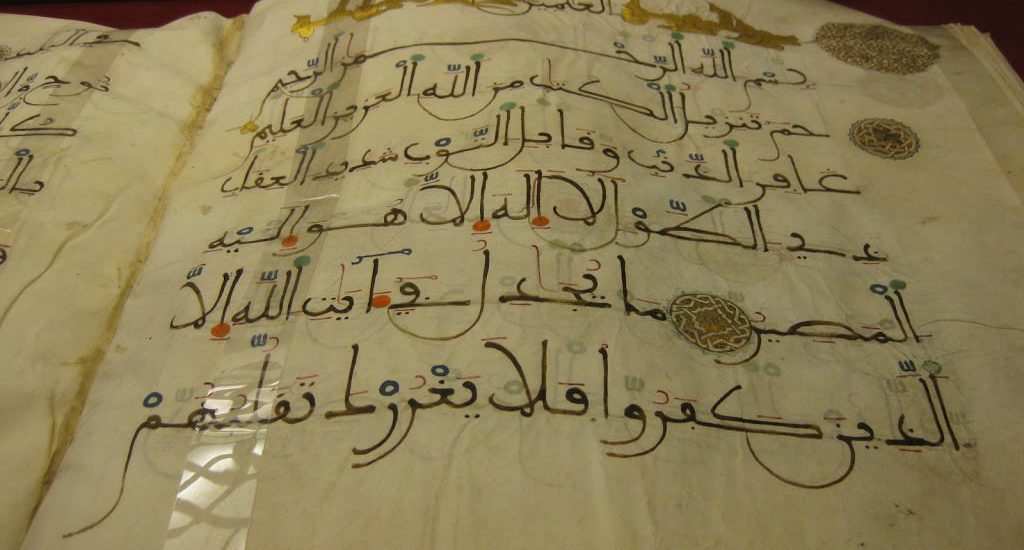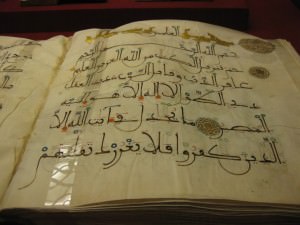Franciscan Friday’s on Ramadan: Fasting to Reorient

To celebrate interfaith friendship and St. Francis’ history with Islam, Franciscan Fridays is starting a series on Ramadan. Check back every Friday though August 17 for posts by Fr. Michael Calabria, OFM.
 |
|||
| A late-medieval Qur’an from Spain, opened to Sura (Chapter) 40 which begins: “The revelation of the Book is from God, the Mighty and Omniscient.” |
Fasting. For most American Catholics it’s now a rather minor affair that goes by almost without notice: no meat on Ash Wednesday, Good Friday and Fridays during Lent. Even while observing Church law, many regard fasting as an obsolete medieval practice that reflects unhealthy attitudes towards the body and which has little value in the contemporary world.
For our Eastern Catholic and Orthodox brothers and sisters, however, it’s quite a serious matter. Fasting in the eastern Churches means maintaining a vegan diet, abstaining not only from meat, but also from fish, eggs, and all dairy products during the fast periods which include Advent and Lent, the Fast of the Apostles (two to six weeks after Pentecost) and the Fast of the Dormition of Mary (15 days in August), in addition to Wednesdays and Fridays throughout the year.
Today, Muslims around the world begin the month-long fast of Ramadan. This is not merely abstaining from certain foods, however. It means that, for twenty-nine days, between sunrise and sunset, nothing is to eaten or drank – not even water. Since the Muslim calendar is a lunar one, the month of Ramadan “travels” through the solar year.
With Ramadan falling in July and August this year, the fast will be a particularly rigorous one lasting sixteen to seventeen hours each day in the northern hemisphere where most of the world’s Muslim population is concentrated. While the very young and old are exempted from the fast, as well those who are in poor health, travelers, and women who are menstruating or pregnant, many of the world’s 1.6 billion Muslims will put their bodies and wills to the test at the hottest time of the year.
Why would so many put themselves through such a physically taxing practice that tries the stamina of even the strongest? The simplest answer is because the Qur’an requires it. According to the second sura (chapter) of the Qur’an, verse 185, the Qur’an was (initially) revealed during the month of Ramadan. While Christians believe “the Word became flesh” (John 1:14) in Jesus Christ, for Muslims the Word became BOOK. In other words, for Muslims the Love, Wisdom, Will and Mercy of God is revealed above all in the verses (literally, “the signs”) of the Qur’an.
While the fast of Ramadan may sound like a particularly severe way of celebrating Scripture, the Qur’an itself explains: “God does not want difficulties for you, but to complete the period (of the fast) to glorify Him on account of having guided you and that you might be grateful” (2.185). Here, then, is an essential aspect of Ramadan: to glorify God and give God thanks.
As in Judaism and Christianity, the fast is intended, not to punish the body, but as an aid to reorient the individual from being self-centered (egocentric) to being God-centered (theocentric).
Today, as our Muslim brothers and sisters begin their observance of Ramadan, let us devote a portion of this day to an awareness of God, giving thanks for the myriad ways in which God reveals God-self to us.
Fr. Michael Calabria, OFM is a Franciscan friar of Holy Name Province. For the past nine years he has taught Arabic and Islamic Studies at St. Bonaventure University, and is currently pursuing his doctorate in Arab and Islamic Studies with the University of Exeter, UK, and serving as a chaplain-in-residence at Georgetown University. Fr. Michael has lived, ministered and taught in Egypt, has traveled extensively in the Middle East, and speaks widely on Islam, Middle Eastern Affairs, and Christian-Muslim Relations.
Tagged in:

